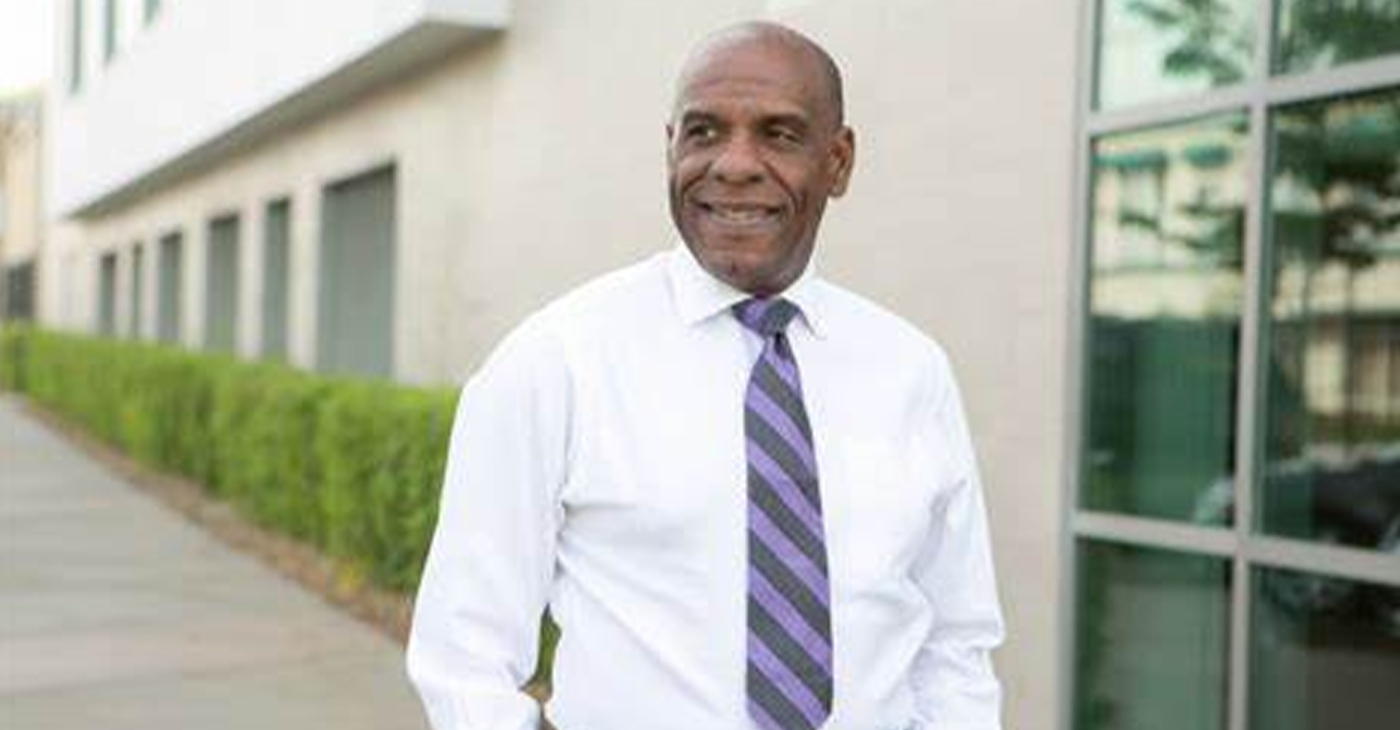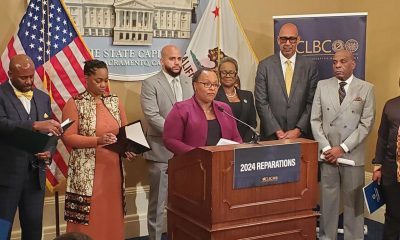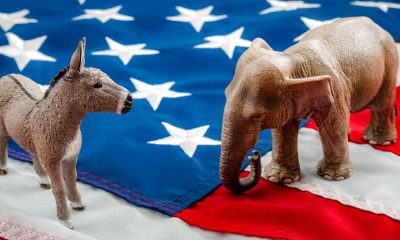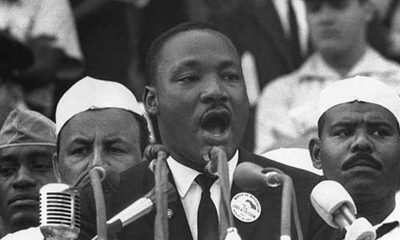Politics
New Kansas Rules Would Limit Spending of Welfare Benefits

In this April 13, 2015 photo, Kansas Republican Gov. Sam Brownback makes a point during an interview in his office in the Statehouse in Topeka, Kan. Brownback is preparing to sign welfare legislation restricting how poor families can spend cash assistance from the state. The Republican governor scheduled a Thursday, April 16, 2015, morning signing ceremony at the Statehouse. (AP Photo/John Hanna)
JOHN HANNA, AP Political Writer
TOPEKA, Kan. (AP) — A new Kansas law tells poor families that they can’t use cash assistance from the state to attend concerts, get tattoos, see a psychic or buy lingerie. The list of don’ts runs to several dozen items.
More than 20 other states have such lists. But, the one included by the Republican-dominated Kansas Legislature in a bill that GOP Gov. Sam Brownback planned to sign Thursday appears to be the most exhaustive, according to state Department for Children and Families officials.
It’s inspired national criticism and mockery from “The Daily Show.” Host Jon Stewart suggested that in accepting federal funds, Kansas should be forced to give up items like roads “paved with luxurious asphalt.”
“The list has attracted attention because it feels mean-spirited,” said Shannon Cotsoradis, president and CEO of the advocacy group Kansas Action for Children. “It really seems to make a statement about how we feel about the poor.”
It is part of a broader welfare law taking effect in July that Brownback and his allies say is aimed at moving poor families from social services into jobs.
“We want to get people off of public assistance and into private-sector employment, and we’ve had a lot of success with that,” Brownback during an interview this week with The Associated Press.
A 2012 federal law requires states to prevent benefit-card use at liquor stores, gambling establishments or adult-entertainment businesses.
At least 23 states have their own restrictions on how cards can be used, mostly for alcohol, tobacco, gambling and adult-oriented businesses, according to the National Conference of State Legislatures.
A few states — not Kansas — prohibit buying guns, according to the NCSL, and a few ban tattoos or body piercings. Massachusetts prohibits spending on jewelry, bail bonds, or “vacation services.” A 2014 Louisiana law bars card use on cruise ships, which is also on the Kansas list.
Kansas Department for Children and Families officials said that it’s difficult to track how often cash assistance is used for items on the state’s new list because recipients can use their benefits cards to obtain cash. The law will limit ATM withdrawals of cash assistance to $25 a day.
The department said it reclaimed $199,000 in cash assistance from 81 fraud cases from July through February, but said most involved questions about eligibility. The state provided $14 million in cash assistance during the same period.
A 2014 federal report said a check of eight states’ data showed transactions with benefit cards at liquor stores, casinos or strip clubs accounted for less than 1 percent of the total.
Critics question whether such restrictions can be enforced. Elizabeth Schott, senior fellow with the left-leaning Center on Budget and Policy Priorities, said enacting them simply creates an “aura of abuse.”
“Undermining support for the programs is what the restrictions do,” she said.
Phyllis Gilmore, Kansas secretary for children and families, said her state’s list is a “composite” of others and has educational value, sending the message that cash assistance should be used for necessities.
“Every dollar that is used fraudulently is a dollar that is not going to an American who is struggling,” said state Sen. Michael O’Donnell, a Wichita Republican who supported the bill.
Much of the new Kansas law codifies administrative policies enacted after Brownback took office in January 2011, so they’ll be harder to undo later.
They include a requirement that cash assistance recipients work at least 20 hours a week, be looking for work or enroll in job training. The new law also includes a much-criticized provision shortening the lifetime cap on cash assistance to 36 months from 48 months, although the state Department for Children and Families said recipients rarely bump up against the lower limit.
The number of cash assistance recipients in Kansas has dropped 63 percent since Brownback took office, to about 14,700 in February. Brownback said the decline confirms the success of his policies, but critics note that U.S. Census Bureau figures show the state’s child poverty rate remaining at about 19 percent through 2013.
Brownback said his state’s list of prohibited cash-assistance uses has become a way for the left to argue against welfare-to-work policies.
“I think you’re seeing the left trying to pillory this,” Brownback said. “They’re just trying to poke fun at it, when it’s not what the debate is really about.”
___
Online:
Text of Kansas welfare measure: http://bit.ly/1H8k7SD .
Kansas Legislature: http://www.kslegislature.org
___
Follow John Hanna on Twitter at https://twitter.com/apjdhanna
Copyright 2015 The Associated Press. All rights reserved. This material may not be published, broadcast, rewritten or redistributed.
Activism
Oakland Post: Week of April 17 – 23, 2024
The printed Weekly Edition of the Oakland Post: Week of April 17 – 23, 2024

To enlarge your view of this issue, use the slider, magnifying glass icon or full page icon in the lower right corner of the browser window. ![]()
Barbara Lee
Congresswoman Barbara Lee Issues Statement on Deaths of Humanitarian Aid Volunteers in Gaza
On April 2, a day after an Israeli airstrike erroneously killed seven employees of World Central Kitchen (WCK), a humanitarian organization delivering aid in the Gaza Strip, a statement was release by Rep. Barbara Lee (D-CA-12). “This is a devastating and avoidable tragedy. My prayers go to the families and loved ones of the selfless members of the World Central Kitchen team whose lives were lost,” said Lee.

By California Black Media
On April 2, a day after an Israeli airstrike erroneously killed seven employees of World Central Kitchen (WCK), a humanitarian organization delivering aid in the Gaza Strip, a statement was release by Rep. Barbara Lee (D-CA-12).
“This is a devastating and avoidable tragedy. My prayers go to the families and loved ones of the selfless members of the World Central Kitchen team whose lives were lost,” said Lee.
The same day, it was confirmed by the organization that the humanitarian aid volunteers were killed in a strike carried out by Israel Defense Forces (IDF). Prior to the incident, members of the team had been travelling in two armored vehicles marked with the WCF logo and they had been coordinating their movements with the IDF. The group had successfully delivered 10 tons of humanitarian food in a deconflicted zone when its convoy was struck.
“This is not only an attack against WCK. This is an attack on humanitarian organizations showing up in the direst situations where food is being used as a weapon of war. This is unforgivable,” said Erin Gore, chief executive officer of World Central Kitchen.
The seven victims included a U.S. citizen as well as others from Australia, Poland, the United Kingdom, Canada, and Palestine.
Lee has been a vocal advocate for a ceasefire in Gaza and has supported actions by President Joe Biden to airdrop humanitarian aid in the area.
“Far too many civilians have lost their lives as a result of Benjamin Netanyahu’s reprehensible military offensive. The U.S. must join with our allies and demand an immediate, permanent ceasefire – it’s long overdue,” Lee said.
Community
Financial Assistance Bill for Descendants of Enslaved Persons to Help Them Purchase, Own, or Maintain a Home
California Legislative Black Caucus (CLBC) vice chair Sen. Steven Bradford (D-Inglewood) introduced new legislation related to reparations to the Senate Committee on Housing on April 2 in Sacramento. Senate Bill (SB) 1007, “establishes the Homeowner’s Assistance for Descendants of Enslaved Persons Program to make financial aid or assistance available to descendants for the purposes of purchasing, owning, or maintaining a home,” the legislation states.

California Legislative Black Caucus (CLBC) vice chair Sen. Steven Bradford (D-Inglewood) introduced new legislation related to reparations to the Senate Committee on Housing on April 2 in Sacramento.
Senate Bill (SB) 1007, “establishes the Homeowner’s Assistance for Descendants of Enslaved Persons Program to make financial aid or assistance available to descendants for the purposes of purchasing, owning, or maintaining a home,” the legislation states.
The Senate Housing Committee advanced the bill with an 8-1 vote. It will be re-referred to the Appropriations Committee for consideration.
Sen. Kelly Seyarto (R-Murrieta) was the only member who voted against the bill.
“SB 1007 is about starting a long process of paying back a debt that is not only owed, but that was also promised, and is 160 years overdue, to African Americans,” Bradford told the committee chaired by Sen. Nancy Skinner (D-Berkeley). “It is the first step in closing the wealth and equity gap created by centuries of slavery and racial discrimination policies.”
The bill aligns with one of the 115 recommendations listed in a two-year study conducted by the California reparations task force, of which Bradford was one of nine members.
Bradford said the report reveals that, in the state of California, a typical Black-owned home is 22% less valuable than a White-owned home.
Various advocacy groups from around the state attended the hearing held at the State Capitol Annex Swing Space. The California Housing Partnership, Bay Area Regional Health and Inequities Initiative, Coalition for A Just and Equitable California, Disability Rights of California, the American Civil Liberties Union of California, and California Community Builders all voiced their support of the bill.
-

 Activism4 weeks ago
Activism4 weeks agoOakland Post: Week of March 20 – 26, 2024
-

 #NNPA BlackPress3 weeks ago
#NNPA BlackPress3 weeks agoCOMMENTARY: D.C. Crime Bill Fails to Address Root Causes of Violence and Incarceration
-

 #NNPA BlackPress3 weeks ago
#NNPA BlackPress3 weeks agoMayor, City Council President React to May 31 Closing of Birmingham-Southern College
-

 #NNPA BlackPress4 weeks ago
#NNPA BlackPress4 weeks agoFrom Raids to Revelations: The Dark Turn in Sean ‘Diddy’ Combs’ Saga
-

 #NNPA BlackPress4 weeks ago
#NNPA BlackPress4 weeks agoCOMMENTARY: Lady Day and The Lights!
-

 Activism3 weeks ago
Activism3 weeks agoOakland Post: Week of March 27 – April 2, 2024
-

 #NNPA BlackPress4 weeks ago
#NNPA BlackPress4 weeks agoBaltimore Key Bridge Catastrophe: A City’s Heartbreak and a Nation’s Alarm
-

 #NNPA BlackPress4 weeks ago
#NNPA BlackPress4 weeks agoBaltimore’s Key Bridge Struck by Ship, Collapses into Water

















































